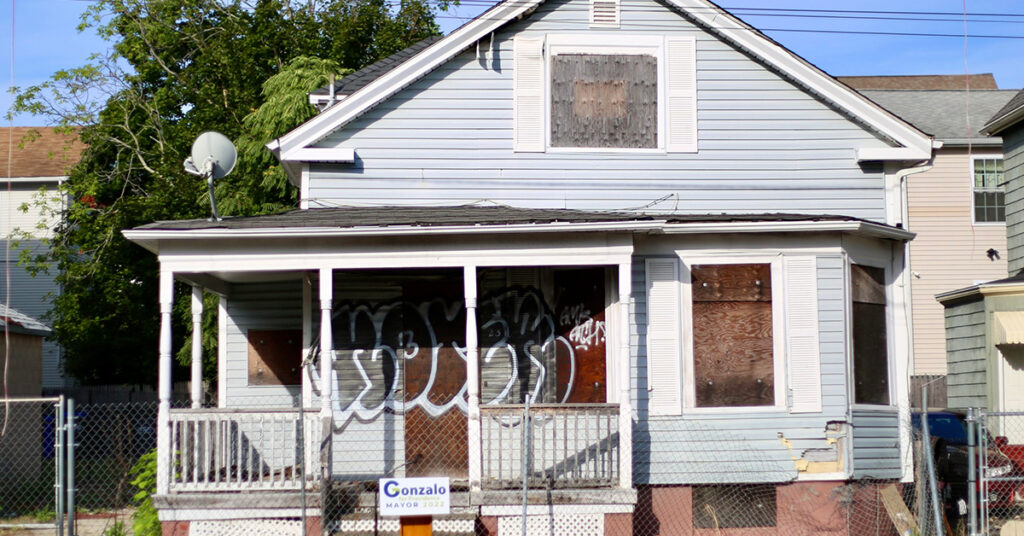
Providence Mayor Jorge Elorza announced the creation of the Providence Neighborhood Land Bank, a new program through the Providence Redevelopment Agency, funded by the Providence Housing Trust Fund, that will acquire, hold, and transfer underused vacant land throughout the City with the goal of generating new affordable housing and revitalizing Providence neighborhoods. The City is setting aside $8.5M of Providence’s American Rescue Plan Act (ARPA) funds for the program and today’s announcement comes with an ask: an open call to help identify potential lots for the Land Bank.
“Bold policies and funding are needed to address the housing crisis in Rhode Island and nationwide,” said Mayor Elorza. “The Providence Neighborhood Land Bank Program is an important step in finding creative solutions to transform neighborhoods and prioritizing land for those who need it most.”
“We all know of an abandoned property or vacant lot in our neighborhoods that could be transformed into safe, affordable places to live,” said Providence City Councilmember Rachel Miller (Ward 13), who is expected to become Council President in January. “If residents can help connect the dots in the coming months and alert the Providence Neighborhood Land Bank to these locations, the city, through the Providence Redevelopment Agency, can help turn these properties into desperately needed affordable housing.
The Providence Neighborhood Land Bank program has three stages – acquire, hold, and dispose – with policies for each stage of the process.
Stage 1 – Acquisition: The PRA maintains a live database of vacant, abandoned, and dilapidated property in PVD. Once a property has been properly screened to conform with the acquisition policies, such as zoning, lot size, and suitability of the lot for infill housing, the program will utilize of one of many tools by which it can acquire property. These tools include purchases from the city’s tax-reverted list, donations, negotiated purchases, and eminent domain, among others.
Stage 2 – Holding: Once a property has been acquired it enters the “banking” phase of the process. During this holding period, the PRA will take steps to ready the parcel for development, such as:
- Extinguish any liens and clear the title of any defects.
- Acquire and assemble neighboring lots as part of larger developments.
- Obtain exemption from property taxes during the time of Land Bank ownership.
- Maintain the property, including emergency repairs, landscaping, and security.
- Conduct environmental and other necessary site inspections.
- Create the terms of development including price and use.
The PRA can hold property indefinitely, but the intent is to quickly turn around lots for redevelopment to spur housing production.
Stage 3 – Disposition: Governed by a set of disposition policies, the PRA will transfer properties in its portfolio for redevelopment, when appropriate. Some projects, such as a single-family home may be ready for transfer shortly after acquisition. Other projects may take several months or longer. Either way, the Land Bank program provides flexibility in timing, with the PRA responsibly acting as steward while the property is being held for development.
The program is designed to be flexible enough to include new partners and opportunities as they arise. This program will be an important tool for advancing affordable housing construction and community revitalization.
“American Rescue Plan Act funds are meant to provide relief and assistance to our most impacted community members, and so part of those ARPA funds allocated to the PRA should and will be used to acquire, hold and activate vacant land specifically for the creation of affordable housing,” said PRA Executive Director Bonnie Nickerson. “We are excited to partner with our talented community development organizations to help boost their capacity. Together, with this program in place, driven by community input, we can make significant strides in increasing affordable housing in our City.”
A crucial component of the Providence Neighborhood Land Bank is the opportunity for Providence community members and stakeholders to nominate vacant plots of land for consideration. The Providence Redevelopment Agency is asking for suggestions via email to LandBank@providenceri.gov. From there, depending on viability, they will be entered into a live database of vacant, abandoned, and dilapidated property for possible acquisition.


